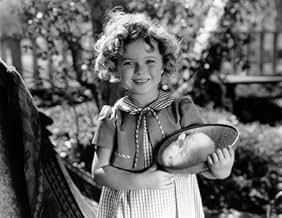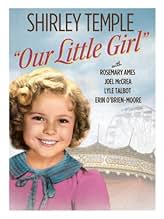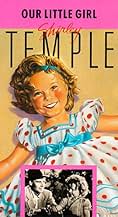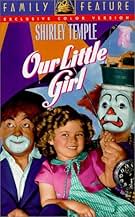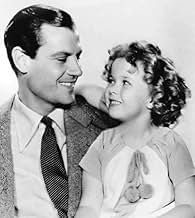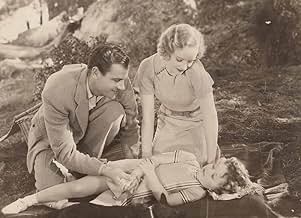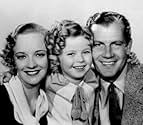Añade un argumento en tu idiomaA troubled child tries to patch up her parents' broken marriage by running away.A troubled child tries to patch up her parents' broken marriage by running away.A troubled child tries to patch up her parents' broken marriage by running away.
- Dirección
- Guión
- Reparto principal
- Premios
- 1 premio en total
Jack Baxley
- Leyton - Druggist
- (sin acreditar)
Jack Donohue
- Actor
- (sin acreditar)
Doris Nolan
- Undetermined Role
- (sin confirmar)
- (sin acreditar)
Reseñas destacadas
OUR LITTLE GIRL (Fox, 1935), directed by John Robertson, a domestic drama taken from a story "Heaven's Gate," stars Shirley Temple, Joel McCrea and someone by the name of Rosemary Ames (in her final screen appearance following a very brief movie career). Similar in theme to RKO Radio's WEDNESDAY'S CHILD (1934) that revolves around a boy (Frankie Thomas) whose happy home is disrupted by the separation of his parents (Edward Arnold and Karen Morley), OUR LITTLE GIRL centers around the moppet Temple facing the same situation of her own, but without any courtroom or child custody battles, which might have helped quicken the pace or added more interest to a somewhat slow scenario.
Set in a small town, the plot introduces the Middletons as a happy family: Donald (Joel McCrea), a respectable doctor; Elsa (Rosemary Ames), his loving wife, and their little girl, Molly (Shirley Temple) who looks forward to their twice a year family picnic each May and September Saturday at a park called Heaven's Gate. Donald works long and hard on his experiments along with his assistant, Sarah Boiton (Erin O'Brien-Moore), a nurse who's secretly in love with him. Because he's away from home too often, Elsa spends much of her lonely hours with Rolfe Brent (Lyle Talbot), her former horse breading beau who recently has moved into town from Europe. Due to Donald's misunderstanding and jealously towards Elsa and Rolfe, the couple argue, leading little Molly to find herself caught in the middle of things, and unable to comprehend why her father will no longer be living with them anymore. After overhearing a conversation between her mother and Rolfe that has her believing that she's the cause for her parent's separation, Molly decides to take matters into her own hands by leaving home.
A minor Temple drama with little of the Temple formula intact. Aside from singing a lullaby to her doll and later playing Stephen Foster's "Banjo on My Knee" on the piano, there are no songs nor dance numbers. Considering its theme, song interludes have no precedence in the story, though some slight doses of humor including Temple on the seesaw with her dog, Sniffy, as examples that keep the narrative from becoming strictly melodramatic. Unlike her more recent releases, OUR LITTLE GIRL, is the only one of Temple's leading roles that can be categorized as strictly "B" product, considering it being the shortest (63 minutes) of her starring film roles.
Others in the supporting cast consist of Poodles Hannerton as the Circus Performer; Margaret Armstrong (Amy, the Middleton housekeeper); Ruth Owin (Alice) and Leonard Carey (Jackson), each as Brent's servants; and best of all, J. Farrell MacDonald billed as Mr. Tramp, playing a homeless man who comforts little Molly by listening to her story as to why she's leaving home. This little scene is well handled, with some humor in spoken dialog by Shirley thrown in for good measure. Watch for it.
OUR LITTLE GIRL became one of many Temple movies to become available on video cassette during the late 1980s and then on DVD in both black and white and colorized formats. Formerly presented on The Disney Channel in the 1980s in colorized version, it then turned up on American Movie Classics as part of its Sunday morning "Kids Classics" (1996-2001), and finally on the Fox Movie Channel in its original black and white format. Bob Dorian, former host of AMC, once commented in his profile about OUR LITTLE GIRL in saying that its working title "Heaven's Gate" had been changed prior to release due to it the name suggesting a cemetery, leaving an indication as being a movie about death.
Although OUR LITTLE GIRL didn't turn out as interesting as the rarely seen WEDNESDAY'S CHILD (1934), nor become the Academy Award winner as KRAMER Vs. KRAMER (1979), it's one of those little movies that might have been better had it not been hampered by a weak script. Had it not been for "Our Little Girl" Shirley Temple in the title role keeping the story alive with her know-how performance, then this minor effort of hers would certainly have ended up along with many old Fox Films to be either lost, forgotten or both. (**1/2)
Set in a small town, the plot introduces the Middletons as a happy family: Donald (Joel McCrea), a respectable doctor; Elsa (Rosemary Ames), his loving wife, and their little girl, Molly (Shirley Temple) who looks forward to their twice a year family picnic each May and September Saturday at a park called Heaven's Gate. Donald works long and hard on his experiments along with his assistant, Sarah Boiton (Erin O'Brien-Moore), a nurse who's secretly in love with him. Because he's away from home too often, Elsa spends much of her lonely hours with Rolfe Brent (Lyle Talbot), her former horse breading beau who recently has moved into town from Europe. Due to Donald's misunderstanding and jealously towards Elsa and Rolfe, the couple argue, leading little Molly to find herself caught in the middle of things, and unable to comprehend why her father will no longer be living with them anymore. After overhearing a conversation between her mother and Rolfe that has her believing that she's the cause for her parent's separation, Molly decides to take matters into her own hands by leaving home.
A minor Temple drama with little of the Temple formula intact. Aside from singing a lullaby to her doll and later playing Stephen Foster's "Banjo on My Knee" on the piano, there are no songs nor dance numbers. Considering its theme, song interludes have no precedence in the story, though some slight doses of humor including Temple on the seesaw with her dog, Sniffy, as examples that keep the narrative from becoming strictly melodramatic. Unlike her more recent releases, OUR LITTLE GIRL, is the only one of Temple's leading roles that can be categorized as strictly "B" product, considering it being the shortest (63 minutes) of her starring film roles.
Others in the supporting cast consist of Poodles Hannerton as the Circus Performer; Margaret Armstrong (Amy, the Middleton housekeeper); Ruth Owin (Alice) and Leonard Carey (Jackson), each as Brent's servants; and best of all, J. Farrell MacDonald billed as Mr. Tramp, playing a homeless man who comforts little Molly by listening to her story as to why she's leaving home. This little scene is well handled, with some humor in spoken dialog by Shirley thrown in for good measure. Watch for it.
OUR LITTLE GIRL became one of many Temple movies to become available on video cassette during the late 1980s and then on DVD in both black and white and colorized formats. Formerly presented on The Disney Channel in the 1980s in colorized version, it then turned up on American Movie Classics as part of its Sunday morning "Kids Classics" (1996-2001), and finally on the Fox Movie Channel in its original black and white format. Bob Dorian, former host of AMC, once commented in his profile about OUR LITTLE GIRL in saying that its working title "Heaven's Gate" had been changed prior to release due to it the name suggesting a cemetery, leaving an indication as being a movie about death.
Although OUR LITTLE GIRL didn't turn out as interesting as the rarely seen WEDNESDAY'S CHILD (1934), nor become the Academy Award winner as KRAMER Vs. KRAMER (1979), it's one of those little movies that might have been better had it not been hampered by a weak script. Had it not been for "Our Little Girl" Shirley Temple in the title role keeping the story alive with her know-how performance, then this minor effort of hers would certainly have ended up along with many old Fox Films to be either lost, forgotten or both. (**1/2)
Haul out the bathtowels on this one. No parents like Joel McCrea and Rosemary Ames are getting divorced as long as they have an offspring like Shirley Temple to keep them together.
Our Little Girl finds America's favorite moppet the daughter of the aforementioned couple. Joel is a research doctor who takes a small country practice to both support his wife and his daughter. But he gets so involved in his experiments he's leaving his wife alone to the attention of his playboy neighbor Lyle Talbot. And he's looking like someone his nurse Erin O'Brien-Moore just might be able to catch on the rebound.
The film had a great deal more potential than what we got. It could have been a serious look at divorce through a child's eyes. I think that's what they were trying for at Fox, but the problem was that Shirley's audiences expected things to go a certain way in her films. So Fox gave them the typical Shirley and then some. It was the 'and then some' that doomed this film to a weepy soggy mess.
Our Little Girl finds America's favorite moppet the daughter of the aforementioned couple. Joel is a research doctor who takes a small country practice to both support his wife and his daughter. But he gets so involved in his experiments he's leaving his wife alone to the attention of his playboy neighbor Lyle Talbot. And he's looking like someone his nurse Erin O'Brien-Moore just might be able to catch on the rebound.
The film had a great deal more potential than what we got. It could have been a serious look at divorce through a child's eyes. I think that's what they were trying for at Fox, but the problem was that Shirley's audiences expected things to go a certain way in her films. So Fox gave them the typical Shirley and then some. It was the 'and then some' that doomed this film to a weepy soggy mess.
Unusual for its time, "Our Little Girl" is about the disintegration of a marriage as seen through the eyes of a little girl. Dad's a busy and preoccupied doctor and medical researcher who is oblivious to his family and his adoring nurse. Mom's bored and lonely at home and Dad won't hear of her coming back to work in the office. Rolfe, a rich horsey neighbor, takes her riding and you know the rest. What's interesting, however, is how the breakup of the marriage impacts the life of the little girl. She is baffled and disoriented and she blames herself for destroying her parents' happiness. She can't warm up to Rolfe who tries unsuccessfully to buy her friendship. Ultimately, she runs away from home. Things are whitewashed by an implausible feel-good happy ending but up to that point the treatment of the catastrophic effects of divorce on a small child is done very well. Shirley, of course, is adorable as always.
While I enjoy the old Shirley Temple films, I am occasionally shocked at how depressing and scary many of the plots were. In one, she is separated from her father and is pursued by a creepy guy who keeps offering to take her out and buy her candy, in MANY she's an orphan and in this one she's in the middle of two parents who are divorcing! Family-friendly, perhaps, but definitely films with a dark side.
In this film, it begins with the Middleton family being happy as can be. Their daughter, Molly (Temple) is adored and everything seems just peachy. However, over time you notice that Dr. Middleton (Joel McCrea) is often so wrapped up in his work that he neglects his sweet wife, Elsa (Rosemary Ames). It's obvious to everyone but him that his wife is lonely and needs him. Eventually, she sets her eyes on the Doc's best friend, Rolfe Brent (Lyle Talbot) and soon she and Brent are in love...and she's seeking a divorce! Molly naturally is effected by all this and eventually runs away! Will these dopey parents give up their selfish ways and make a family for Molly once again? What do you think?!
Like so many of Shirley's films, this one is an obvious object lesson on good parenting and the importance of family. So, despite being a tiny bit traumatic, it does all end well and emphasizes good old fashioned values. It is a bit of a departure, though, as in this one Shirley does NOT sing and the film has a much more compact plot than usual...hence its very short running time compared to her other full-length films. Well worth seeing and sweet.
In this film, it begins with the Middleton family being happy as can be. Their daughter, Molly (Temple) is adored and everything seems just peachy. However, over time you notice that Dr. Middleton (Joel McCrea) is often so wrapped up in his work that he neglects his sweet wife, Elsa (Rosemary Ames). It's obvious to everyone but him that his wife is lonely and needs him. Eventually, she sets her eyes on the Doc's best friend, Rolfe Brent (Lyle Talbot) and soon she and Brent are in love...and she's seeking a divorce! Molly naturally is effected by all this and eventually runs away! Will these dopey parents give up their selfish ways and make a family for Molly once again? What do you think?!
Like so many of Shirley's films, this one is an obvious object lesson on good parenting and the importance of family. So, despite being a tiny bit traumatic, it does all end well and emphasizes good old fashioned values. It is a bit of a departure, though, as in this one Shirley does NOT sing and the film has a much more compact plot than usual...hence its very short running time compared to her other full-length films. Well worth seeing and sweet.
Our little Shirley stars in a real tear jerker but the wee gal still brings a smile to anyone's face
Dr. Donald Middleton (Joel McCrea) wanted to be a research physician, discovering important cures. However, when his wife, Elsa (Rosemary Ames) became pregnant, he settled for being a smalltown, New England family physician. Still, he is conducting his own experiments on the side but the result is that he works extremely long hours. Elsa has been patient, for she loves her husband and knows he cares for her and their daughter, Molly (Shirley Temple). Dr. Don still manages to take a break for Molly's "May and September Saturdays", that is, two picnics at a local park called Heaven's gate, where Don and Elsa met. One day, a handsome, rich male neighbor returns to his mansion next door. He invites Elsa and Don to ride with him on various mornings, but only Elsa has time for it. Trouble starts to brew when the neighbor makes a big play for the beautiful Elsa and Dr. Don continues to spend more time away from the house. Just what will be the result? This is a tearjerker of a film which, nevertheless, produces giggles, also, when Shirley is on the screen with her beloved doggie, Sniff. Just like any little girl, Shirley's Molly is pretty oblivious to problems at home so she continues to sing, dance, and crack jokes, even when her parents are having severe problems. McCrea is very good as the fine but workaholic father while Ames is pretty and touching as the neglected wife. All other lesser actors do a nice job, too. The picnic scenes are beautiful, the costumes quite acceptable, and the storyline is a true heartgrabber. Therefore, if you want to see Shirley in a smile-through-my-tears little flick, get this one soon. It might even bring estranged couples together again, for its support of marital reconciliation is very uplifting, even as the kiddies are entertained, too.
¿Sabías que...?
- CuriosidadesThe studio thought that this film's original title, "Heaven's Gate," sounded too much like a cemetery and changed it to "Our Little Girl."
- Citas
Elsa Middleton: Mother's going away for a little while. And, when she comes back, she won't be married to Daddy anymore.
Molly Middleton: Who will you be married to, Mommy?
- ConexionesFeatured in Grandes biografías: Shirley Temple: The Biggest Little Star (1996)
- Banda sonoraLullaby to a Doll
(1935) (uncredited
Music by Lew Pollack
Lyrics by Paul Francis Webster
Sung by Shirley Temple
Selecciones populares
Inicia sesión para calificar y añadir a tu lista para recibir recomendaciones personalizadas
Detalles
- Duración1 hora 5 minutos
- Color
- Relación de aspecto
- 1.37 : 1
Contribuir a esta página
Sugerir un cambio o añadir el contenido que falta

Principal laguna de datos
By what name was Nuestra hijita (1935) officially released in Canada in English?
Responde
